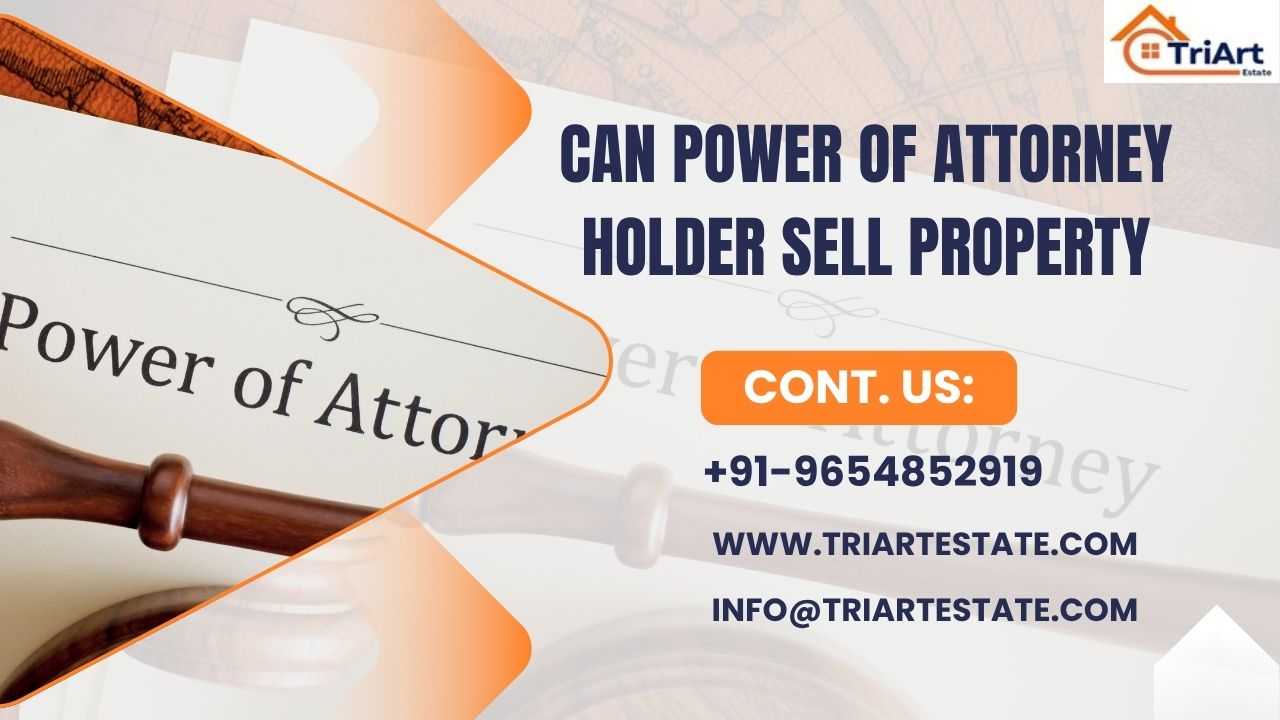A PoA in India is an important legal document. It lets one person (the Principal or Grantor) allow another (their Attorney or Agent) to act for them. This is for specific legal and financial matters.
One common question about real estate in India is, “Can Power of Attorney Holder Sell Property?” In this article, we look at selling property with a Power of Attorney in India. We will discuss the legality of this process. We will also cover the steps involved and any limits that may apply.

Can Power of Attorney Holder Sell Property
Yes, an attorney with Power of Attorney (PoA) can sell property. This is true if their PoA clearly allows them to do so.
Here’s why a Power of Attorney (POA) for selling property can be valid:
- Under the Registration Act of 1908, a Power of Attorney must be registered with the Sub-Registrar. This must be done according to their rules and requirements.
- Documents should clearly state your right to sell or transfer property.
- Attorneys can only act within the limits set by the Powers of Attorney. They must follow the rules in this legal document.
If the Power of Attorney only allows managing property, like collecting rent, it cannot be used to sell. A specific clause for sale must be included for that to happen.
Can Power of Attorney Holder Sell Property to Himself
A common question is whether a PoA holder can sell property directly.
An agent with Power of Attorney cannot sell property to themselves directly unless:
- The PoA clearly allows these sales.
- Transactions happen at fair market value when proper payment and registration procedures are followed.
However, these transactions can be checked by courts for possible conflicts of interest. Original owners and their heirs may also challenge them. Therefore, it is usually better not to sell property back to yourself as the Power of Attorney Holder. This is true unless your PoA document clearly allows it.
Power of Attorney Holder Can Sell the Property
Power of Attorney holder can sell the property if they meet all the conditions listed below:
Valid PoA Document
- Documents need to be signed on stamp paper and registered with the Sub-Registrar.
- You must have the authority to sell, convey, and transfer property.
Owner’s Consent
- At the time of sale, there must be an irrevocable or concurrent Power of Attorney. The person must also have mental capacity.
Sale Deed Execution
- PoA holders sign the sale deed for the owners in front of witnesses. This makes the sale deed a binding contract.
- All sales deeds must be registered under the Registration Act.
Payment of Stamp Duty and Registration Fees
- Full payment is required for transfer transactions to be validated. This includes stamp duty and any fees or charges needed to complete them.
No Violation of Law or Court Orders
- PoA holders cannot sell properties that have court stay orders. They also cannot sell properties that are in dispute with an injunction from the court.
Can a Power of Attorney Holder Sell Property
A Power of Attorney holder acts as an agent for the property owner. With permission from a PoA agreement, they can sell property for the owner. They can also act on the owner’s behalf when selling real estate.

Can Power of Attorney Holder Sell Property – Contact Number +91-9654852919
General POAs do not allow for sales. For that, a special or specific POA is needed.
Can a Power of Attorney Holder Sell Immovable Property
Selling property like land, flats, or houses through a Power of Attorney in India is legal under certain conditions. The Supreme Court explained this in its 2011 Suraj Lamp & Industries Pvt—Ltd v State of Haryana judgment.
- An agreement alone cannot justify selling or transferring property.
- To transfer ownership, you need to register the sale deed.
- PoA holders can sign the sale deed as agents if their Power of Attorney allows it.
A Power of Attorney (PoA) alone cannot prove ownership. An official registered sale deed is also needed to transfer the title to the buyer legally.
Types of Power of Attorney for Property Transactions
“Understand Your Property Agreement (PoA) Before Selling Your Property”
- General Power of Attorney (GPA): GPAs usually give wide powers like managing property, collecting rent, and paying bills. However, a GPA alone often cannot sell property. It needs to include specific permission to do so in its text.
- Special or Specific Power of Attorney (SPA): PoAs that give specific powers, like selling, leasing, or mortgaging properties, are preferred for selling real estate.
- Durable or Irrevocable PoA: It stays valid even if the main person cannot act. This is often used when an attorney has a personal interest in property, like owning part of it.
Process of Selling Property Through a Power of Attorney
Here is the step-by-step process:
- Draft a Registered PoA: “Create and file a Power of Attorney document with the Sub-Registrar.”
- Verify Authority to Sell: Ensure the Power of Attorney clearly allows for selling property.
- Identify Buyer and Agree on Terms: PoA holders talk directly with buyers about pricing and terms.
- Draft the Sale Deed: Prepare a sale deed. Note that the attorney is acting for the owner in making it.
- Register the Sale Deed: Both parties go to the Sub-Registrar’s Office to register. They pay any stamp duty and registration fees that apply.
- Mutation of Property: After a sale deed is registered, buyers need to apply to change the property records to their names.
Important Legal Points to Consider
- Death of the Owner: PoAs become void when their principals die, unless they are irrevocable.
- Revocation of PoA: An owner can withdraw a Power of Attorney agreement at any time, as long as it is irrevocable.
- Encumbrances: Make sure the property you want to sell has no loans, disputes, or legal issues before selling.
- Disclosure: Be clear and let both the buyer and seller know that a Power of Attorney Holder (POA Holder) will handle this sale. This helps prevent any future disputes.
Documents Required for Selling Property Through PoA
- Registered Power of Attorney document.
- Original Property Title Deed.
- Identity proofs from both parties include Aadhar card, PAN card, passport, and more.
- Both the buyer and the PoA holder must provide passport-sized photographs.
- You need a No Objection Certificate (NOC) from the society or the relevant authority, if needed.
- Encumbrance certificate for a property.
- Utility bills and property tax receipts from March.
Tax Implications
- Capital Gains Tax: Owners must pay capital gains tax on any sale profits that are more than what can be deducted under income tax rules.
- TDS: Buyers buying property worth more than Rs 50 lakh must deduct 1% tax at source (TDS). This is according to Section 194-IA of the Income Tax Act.
- GST: According to HMRC rules, a property with immediate occupancy restrictions is not a ready-to-move-in property.
Risks of Selling Property Through PoA
- Fake Power of Attorney documents or misuse of power by an attorney are common scams in legal practice.
- Revoking Power of Attorney by the Owner During a Transaction.
- If the owner dies, legal fights can happen among their heirs.
- Buyers are hesitant because they do not trust PoA sales.

✅ FAQ Section – Can Power of Attorney Holder Sell Property
Q1. Can a Power of Attorney holder sell property in India?
Yes, as long as the Power of Attorney clearly allows for its sale.
Q2. Can a Power of Attorney holder sell the property to himself?
“Only when allowed clearly and when doing transactions at fair market value.”
Q3. Is PoA alone sufficient to transfer property ownership?
No. To transfer ownership, both the PoA holder and the owner must sign an official deed. This is part of a registered sale deed transaction.
Q4. Does the PoA become invalid after the owner’s death?
Yes, unless it involves a permanent Power of Attorney that includes interest.
Q5. What documents are needed to sell property through PoA?
Register a Power of Attorney, the Original Title Deed, Identity Proofs, Tax Receipts, and an Encumbrance Certificate.
Final Thoughts – Can Power of Attorney Holder Sell Property
A person with power of attorney in India can sell property if certain conditions are met.
- A Purchase and Agreement has been recorded. It allows the sale to happen.
- A signed, registered sale deed completes the transfer of ownership.
- All necessary taxes, duties, and legal requirements have been met.
Both buyers and sellers should be careful. They need to check all documents and get legal advice. This helps ensure a fair deal that follows the law.





Join The Discussion